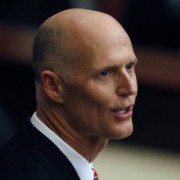Florida Legislature Seeks Renewable-Energy Overhaul
Florida’s energy future is expected to be controversial once again this year.
Some bills propose allowing property owners who produce electricity from renewable sources to sell it directly to tenants, bypassing the utility company. Other bills would reverse a law that allows utilities to charge customers for nuclear plant planning and related costs before the plant is built.
Florida Agriculture Commissioner Adam Putnam, who oversees the state’s Energy Office, is concentrating on crafting an energy bill that helps clear the way for more renewable energy such as solar and biomass. “I want an energy bill that can pass. I learned a long time ago in this business you can make a statement or you can make a law,” Putnam said. “It’s our objective to begin to lay the ground rules through this bill for an energy policy for the state that will pass, that will go the distance.”
Putnam, whose department took over the Energy Office in the summer, plans to present his recommendations to the House Energy and Utilities Policy Committee during the first two weeks of the session, spokesman Sterling Ivey said.
Unlike 29 states that require utilities to generate a certain amount of electricity from renewable or alternative energy sources, such as wind or solar, Florida has no such policy.
“It is very unfortunate, and it is costing the state of Florida, both ratepayers in dollars and in missed job opportunities,” said Stephen Smith, executive director of the Southern Alliance for Clean Energy. “Florida is the largest market in the country that does not have a coherent policy on renewable energy.”
Smith said Putnam and his staff are asking the right questions. The missing link is requiring utility planning that looks not only at cost, but also at risks such as too much dependency on natural gas, Smith said. “There needs to be a top-down review of the planning process in Florida,” Smith said.
Putnam is bullish on renewable energy and wants to see a reduction of the regulatory barriers that are preventing its expansion. He also favors restoring tax credits for renewables, which expired in 2010. He wants the policy to include guidance for the Florida Public Service Commission to take into account fuel diversity when making decisions about new power generation. He also supports nuclear energy. “Over half the state’s electricity is generated from natural gas. In the future, it will be over 70 percent,” Putnam said in December. The state’s two natural gas pipelines originate on the Gulf Coast, and there’s risk from hurricanes and man-made disasters, he said.
Energy bills have failed to pass during the past three legislative sessions because of rate concerns.
Outgoing FPL CEO Armando Olivera said last year he was disappointed at the failure to make progress toward Florida’s energy future in the 2011 legislative session.
On Thursday, FPL spokesman Mark Bubriski said: “As the leader in renewable energy, FPL continues to support efforts to encourage further investment in cost-effective renewable energy generation in the state, and with the appropriate regulatory authorization, we are ready to begin construction at multiple sites in Florida and continue to meet the energy needs of Floridians with reliable and responsible generation.”
Putnam said cost will always be a dominant factor, especially in this difficult economy. “To make sure the lights never go out in Florida like they have in the Northeast and California, it means you are going to generate your electricity from a variety of sources,” Putnam said.
The non-utility players in the renewable industry want legislation that would allow owners of properties such as strip malls, office facilities or farms that install renewable energy equipment to sell electricity directly to their tenants and neighbors. “We are in support of legislation that doesn’t cost money to the ratepayers, but still does something for renewable energy,” said Mike Antheil, executive director of the Florida Alliance for Renewable Energy in West Palm Beach. Its membership includes producers of electricity from biomass, solar, wind and geothermals as well as individuals.
“The property owner should be able to sell it directly. Now they are telling me the only electricity I can buy is from the utility company,” Antheil said. “I am not here to tell you that this will result in tens of thousands of solar installations. It will create a platform.
“The investor-owned utilities have the control. This is such a small change which would mean so much to our industry and so little to them,” Antheil said.
Antheil also favors a bill that ensures property taxes cannot be increased for homeowners or businesses due to weather-hardening such as roof improvements, or the installation of solar or other energy-related devices. Voters approved the measure in 2008, but the legislature has yet to make it into law, Antheil said, calling that an embarrassment.
“We are not blazing any new trails,” Antheil said. “We are just trying to catch up with the rest of the country.”
Source: Palm Beach Post
-------------------------
Get the latest industry news and information from CRE-sources delivered right to your email inbox!
And we promise…no more than one email each morning. CLICK HERE TO SUBSCRIBE TODAY!

